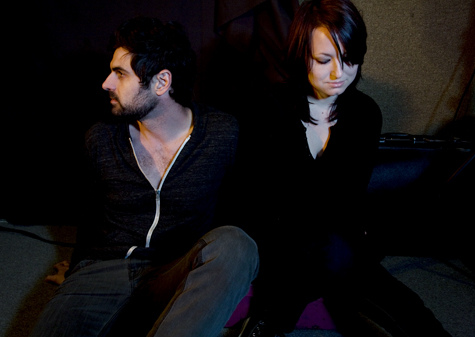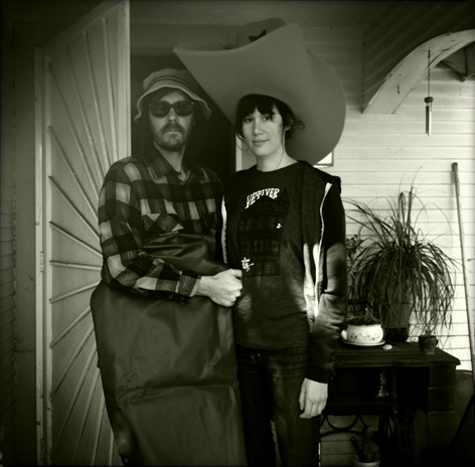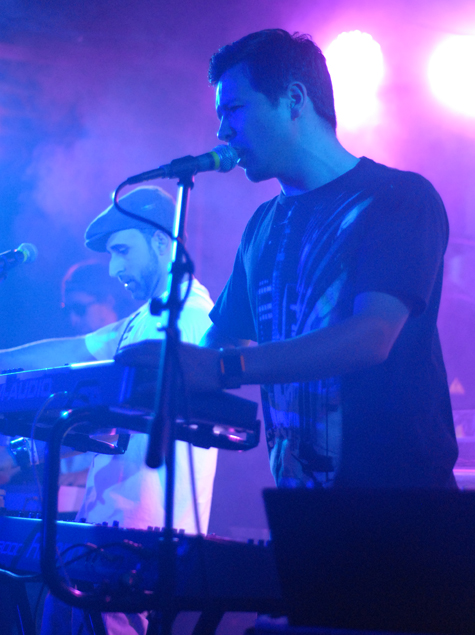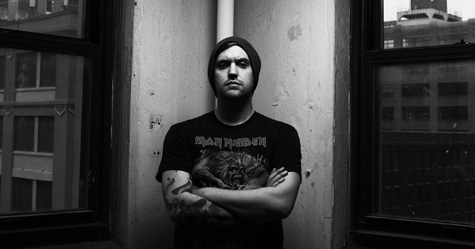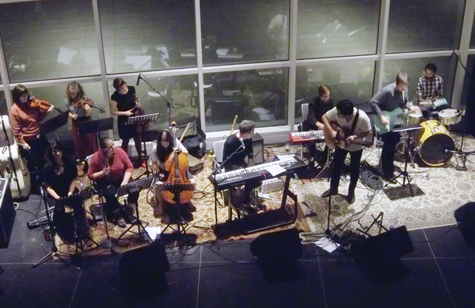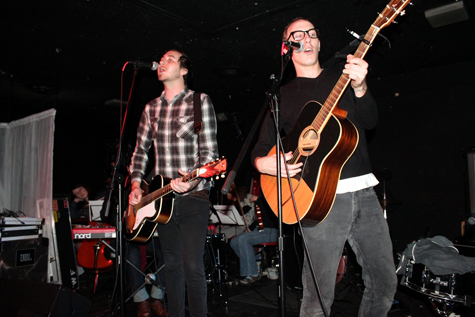Sacramento ex-patriates By Sunlight make a home in Seattle
“What is true by lamplight is not always true by sunlight.” — Joseph Joubert, French moralist/essayist
Though starting with a quote is a bit cliché, especially by anyone like Joubert, who doesn’t exactly get remembered for much other than cute little quips. Still, there is much truth that can be found in an over-simplified message. For the members of the band By Sunlight, maybe the quote would be more along the lines of, “What is true in Sacramento is not always true anywhere else.”
The gentlemen that occupy the moniker By Sunlight (originally known as Bridges) decided a few years back that a new perspective would suit them nicely, and packed their bags and took off to the city synonymous with mediocre sports franchises (at least those remaining), Starbucks, its weather and its iconic music scenes. By Sunlight’s Mike Sparks laughs over the phone during a recent interview when asked if Seattle’s dismal meteorology caused any changes in his music.
“It’s funny that every time I do an interview I get asked that. I guess so?” Sparks remarks, in a sort-of vocal shrugging, “I woke up this morning and it was overcast and I almost had a tear of joy. I mean, it’s beautiful now, but I really like that weather… It’s temperate for me, you know? Living in Sacramento was heinous. I couldn’t stand it at all.”
But, hey, not all of us living here love the heat. Still, moving to Seattle was behind a large part of how he both developed as a musician, and as a person. Sparks continues, “We were ready to get the fuck out of there. Hey man, sometimes when it’s 4:30 p.m., and the sun’s down, and I’ve got three beers in my body, yes, I might feel a bit of darkness in the spirit. There are tons of metal bands up here, tons of punk bands up here, and there is a lot of reflection of that environmental aesthetic in how people behave here, but I wouldn’t describe it as a sullen city either. Yeah, biometrics is a huge fucking change in my life, but going from everything I know to where I don’t know anything, that I would say was a more profound affect rather than the climate.”
After residing in the city for a handful of years and constantly touring, By Sunlight finally decided to settle down, and take a year off from the road. They took to inviting another Sacramento musician, Evan Ferro of Bright Light Fever/Roman Funerals, to make the journey up to the Pacific Northwest, and have Sparks, producer and band member Robert Cheek and Ferro move in together in order to record their latest album.
“We would go home after work or what-not, and we would go straight to working on the record,” Ferro recalls. “Whether it was writing or fine-tuning, it was non-stop. It was a lot of thought, a lot of annoying ourselves with how much we were thinking about it. But, ultimately it became what we wanted it to be.”
Sparks considers the decision to bring Ferro into the picture to be just what the band needed. “It’s kind of what saved our band,” says Sparks. “After the aesthetic exhaustion, fatigue and demoralization that you can sometimes get from working so hard at a band, and not really getting anything. You sort of question your art all the time; it’s that sort of weird, entropic little head thing you can get, and it really pulled us out of all that.”
Robert Cheek, who even now is instrumental as a producer and sound engineer locally–working on albums for Doom Bird, Life in 24 Frames and others–despite not being on full-time duties for this By Sunlight album, is an extremely valuable asset as both a musician and technical mind, and the other members in the band are very aware of it. Particularly since By Sunlight is a very technically minded project, employing many elements that build on and flow through each other, with a sound that is both intricate and intensely mellow, it takes a lot of abstract thought to orchestrate and balance so many elements peacefully.
“I think I’m just so blessed to be in a band with people like [Cheek]–where music is really the only thing of interest to him. For that ethos alone is enough to get a boner for a dude in your band,” Sparks says through a chuckle, “I mean, not literally. It’s like if you have someone you work with intimately all the time that share the same enthusiasm as you, and also you’ve got these huge technical talent.”
“Yeah, he’s valuable. He’s done all our records prior to this one, and even with this one he helped definitely, and did some work also. Yeah, it’s a huge one-up, and we all couldn’t be more grateful for the opportunities that affords us.”
Ferro agrees, taking it a step further: “[Cheek] is a genius. There is not a better word for it, really. He puts so much work into what he is doing, whether it’s a band he is working with or a band he is in. Bob plays in Roman Funerals as well, so I have the experience of not one but two bands with Bob. To have him in a band is a musician’s dream come true. If you’re having second thoughts on a song you are writing, go to Bob and Bob will give you the answer. Actually, it’s somewhat ridiculous.”
With Cheek, Ferro, Sparks, bass player Jack Clemens, and drummer John O’Connell–the only member not from Sacramento (he’s from Virginia)–the band is chock-full of veteran talent. Finished with their latest album, titled Penumbra, they now face the arduous and sometimes daunting task of getting it out there. Starting off with a quick West Coast tour, the guys are looking forward to finally seeing the road again.
“With all the bands I’ve toured with, By Sunlight is the easiest,” says Sparks, “just because, we’ve all done it, you know, too much, and so the emotional thing that is so often an issue on tour, is sort of an old hat for us; it’s not hard at all.
“Not to sound over-confident about it, but we’re all best friends,” Sparks continues, “It’s not like we don’t get into fights sometimes, like when John wants to listen to baseball on the radio, and I just want to sit there and feel sorry for myself. It’s not like those things aren’t going to happen, but there is no fear that the bottom is going to drop out.”
By Sunlight will return to Sacramento on Sept. 8, 2012 when they play Harlow’s with Doom Bird. The 21-and-over show starts at 9 p.m., and tickets can be purchased through http://harlows.com/. For more on By Sunlight, check out their website http://www.bysunlight.com/.
I’m Dirty Too reap the generosity of others to record their first full-length album
“Who do we think we are?” was the question looming over the heads of Sacramento heavy hitting two-piece I’m Dirty Too. After time spent in supporting roles in other bands, the duo’s members are stepping out of the shadows to be co-lead singers on their upcoming full-length debut, The Downhill Dive.
After being acquainted through the local scene for seven years, Zac Brown and Jess Gowrie formed I’m Dirty Too in 2009 to explore the rawer sides of rock they were unable to express in their former and current bands. Gowrie was part of The Drama and Red Host, while Brown was a performing member of Doom Bird, Dusty Brown and Tycho.
The duo jammed in a stoner rock and grunge style, but neither had ever fronted a band. When it came time to record a demo for the purpose of booking shows, they faced the music, as it were, to handle the duties themselves.
“I remember when we first started we didn’t even want to sing in front of each other,” Brown said.
“We were halfway up to Tahoe [for our first show] and I wanted to turn around and go home. I needed a Xanax I was so nervous about singing in front of people.” Gowrie chimed in, “I think after I sang my first song I moved my head away and the whole mic stand just fell over. It was a nightmare coming true.”
Booking an out of town show was part of their plan to gain confidence and receive honest feedback beyond their friends. They also played a game they called “Best Voice,” which involves singing along to radio songs. “You have to belt it out and nail it,” Brown said. “Like outside of your range.”
I’m Dirty Too sought the help of generous strangers on Kickstarter to record The Downhill Dive. They reached their goal and hit the studio in April, splitting time in The Hangar and Dusty Brown’s home studio. With the help of Kris Anaya of Doom Bird on production and Robert Cheek in the engineer’s chair, I’m Dirty Too recorded 12 new songs. When asked if any of the songs from their original demo release made onto the full-length record, Brown offered a quick and jovial, “No, that’s cheating, man!”

Why did you choose the Kickstarter route to fund your record?
Zac Brown: It’s pretty simple. We didn’t have the money to make a record on our own [laughs]. With a tool like Kickstarter out there we thought we might as well utilize it. It’s been really helpful for us.
And you reached your goal with only 39 backers.
Jess Gowrie: We had some special guests donate more than we ever imagined.
ZB: One guy in particular put quite a bit of money in. I think he first donated $100, which was very generous. Then, a few days later the guy upped the donation. It was crazy. Then, he did it again. Jess and I were like what’s going on, is this guy playing a joke on us?
We actually contacted him to say listen, you’re more than generous, and so what’s the deal? But, he just really liked the band and wanted to see the record made.
JG: Yeah, we would have had to ask parents and family members.
ZB: Or have a car wash.
[The donator was Matthew Woods Wilhoit of Prieta and Nine of Swords]
You guys went $215 over the goal amount. Do you have special plans for that extra cash or did you end up using it?
JG: We went way over budget. It just covered the recording costs. It didn’t cover the mixing and mastering.
ZB: It was a great starting point. We were under the delusion we could pay for the whole thing with it, but it didn’t happen. It ended up having to come out of pocket.
What were some of the goals you wanted to achieve with the sound that you discussed with Robert and Kris?
ZB: Well, first of all we’re a two-piece. Live, I put my signal through a bass amp and a guitar amp. I think we achieve a pretty full sound live for a two-piece. We were kind of up in the air on whether we wanted to play bass on the record. Kris basically said we should do exactly what we do live. We were both worried that it wasn’t going to have that low end, that growl a full traditional rock band four-piece gets.
We explained what we wanted to do with Robert, and he totally nailed it. I showed it to my friends and they said things like, “Oh, there’s bass on this part,” but nope, there’s just two guitars and drums. There’s one song with a Moog that my cousin Dusty Brown played. Other than that we achieved an accurate representation of what we do live. We wanted it loud but not overproduced like a lot of rock sounds now.
The grunge and stoner rock influences are there, and I even got a Beth Gibbons of Portishead vibe from a few moments within the record…
ZB: You just made Jess’s day right there. [Laughs] You honestly nailed our three biggest influences.
Is there anything within the record that I possibly missed? Some subtle influences that people might not catch upon first listen?
JG: Well, there is some hardcore country western in there [laughs]. It’s pretty cut and dry. That’s one thing I really like about our band, we stay to the point. A lot of people think there’s some Jesus and Mary Chain in there, but that’s the ‘90s, so we’ve got it covered.
Jess, how difficult is it to sing and hit those pretty notes, while playing the drums? There are drummers that sing, but it’s usually more of a punk ethos of shouting, rather than truly singing.
JG: It’s pretty difficult just because I don’t want to compromise the drums. I find that I’m concentrating way more on the vocals. You have to find that balance of hitting that note, while still playing a cool fill or whatever. I just have to get better at splitting my brain in two.
Have you considered vocal calisthenics? Like singing while running?
ZB: That might be a good idea, Jess.
JG: Yeah, when I do my aerobics in the morning I’ll sing to the EP.
ZB: I’ll film it, and we’ll throw it up on Facebook.
Zac, with being in Tycho, Doom Bird and Dusty Brown, what do you get from I’m Dirty Too that’s not present in those bands?
ZB: Well first and foremost, I finally get to rock out. I’ve not gotten to rock out playing music in a long time. I started with Dusty Brown, and his music is so full. When I first came into it the songs were written and I’d just try to do something over the top of it. There wasn’t a whole lot of room for that visceral release.
With this, I get to jam on my guitar and also it’s my music. I write in the other bands, but I’m less a part of it. I just occupy the guitar sphere. With this we collaborate. Jess has a lot of input on guitars and writes some of the riffs. We’re very hands on with everything. I’m basically creating this and if I blow a note on stage, it’s more of a release. I get to blow off a lot of steam. My playing has always been more of a feel or expression, so when I play this I get to channel that visceral and raw emotion.
I’m Dirty Too’s CD release show at The Townhouse Lounge is on Aug. 3, 2012. The show kicks off at 9 p.m., and those who donated to I’m Dirty Too’s Kickstarter campaign will be able to collect their rewards at the show.
Singer/Songwriter Sherman Baker bears his soul, battles addiction and existential dread…all in a day’s work
Words by Joseph Atkins – Photos by Amy Scott
Sherman Baker has lived multiple lives: struggling Los Angeles actor, recovering heroin addict, mild-mannered songwriter. Yet, there’s something about him that eschews both of the former descriptions and settles on the latter. Baker’s bigger than you imagine, listening to his new full-length, Seventeenth Street. His songs make him sound fragile, delicate; but in person his wide shoulders wrap a guitar while he sings upwards into a microphone. On stage he appears focused, intent. His look is exactly right for the sound, and the qualities of Baker’s sound ultimately condition the person he is.
Up close, it’s hard to tell how much of his personality is shaped by the quiet childhood he describes or the humility of a recovering addict, or where they bleed together. But their silent strength produces songs that slowly engulf one’s attention. Baker has enough self-confidence to expose himself, musically or otherwise, to talk honestly about his past and present. He has a soft-spoken manner that leaves a small impression. He’s like a subtle fill that piques one’s interest and becomes the highlight of a track after multiple listens. He’s normal yet unique, exotic in his low-key banality.
There’s a subtlety to his brand of song craft, a fusion of Dylan and Elliott Smith, with the tonal foundations of old school pop. His hooks and harmonies draw out the anguish and joy of repeated failure and angst, verse after verse. Below them, a series of string melodies and rhythms complement and exacerbate his vocal tracks, as the lyric content demands. There’s a focused tension on the struggle of daily life and survival, but I’d suggest this is bigger than just Baker’s struggle with himself. Seventeenth Street is relaxing, serious and thoughtful in its treatment of uncertain conditions–Baker’s and otherwise. We sat down over water and espresso to discuss these uncertainties, the ups and downs of growing.
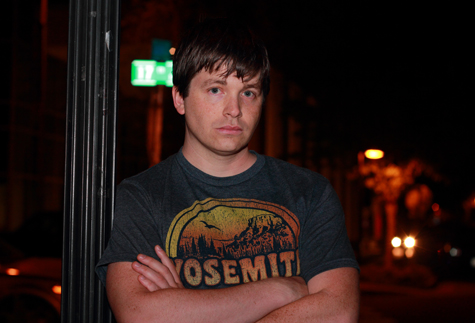
On your opening track, “Constant Contact,” you plead repeatedly for the world to “stop posting things.” Did you check in on Foursquare when we got here?
I did not. I’ve been trying really hard to not be obvious like that. That song came from Facebook [where] an ex-girlfriend used to post about me while we were dating. She’d be like, “Don’t you hate when guys do this.” And then 20 lurker dudes would be like, “Yeah, fuck that guy.”
Do you have other songs about her?
Some of the other songs like, “Golden Gate Park,” “Man on a Wire” and “Sign of Light” are about a [different] ex-girlfriend whom I feel essentially left me for dead and didn’t seem to care that I was overdosing and attempting suicide.
In one of my favorite lines from “Sign of Life” you sing, “There’s no time for philosophy/When you’re fighting/To survive.” The next track follows with another line: “We have tried to be good/But I’d rather be wrong than dead inside.” What is the major antagonist in your life?
The new record is basically about heroin addiction. I was shooting heroin in 2008 to 2009. It wasn’t like, “Oh, Elliott Smith did it, or John Coltrane.” It was a simple addict progression from Vicodin to heroin. A typical Intervention episode was my life. I went to rehab, and after six or seven weeks of horror, I finally came out. The last two years I’ve been moving away from it. I tried to off myself. I was put in a mental hospital. The tension is me trying to fight existential dread.
Yours is actually a success story. Many addicts never even get to rehab. How were you able make the decision to get clean and stay that way?
It’s a daily struggle to stay clean, but I need to in order to survive. There isn’t a way to abuse opiates that doesn’t end in death or severe impairment. My uncle was kind enough to pay for me to go after I asked him for help. It was in L.A. I needed to get out of town. I went a long way from any dealers or money. I was forced to spend a month in one bed crying, shitting and puking on myself. Literally. It was so incredibly painful emotionally; I have felt a little bit numbed ever since. But I’m also certainly a much stronger person. I’m lucky.
I think really great artists tend to be addicted to creating. Do you feel like overcoming one addiction has allowed you to focus your attention more into your musicianship?
One hundred percent. On a physical level, my energy is up; it’s like night and day. I’ve been looking at my music like an athlete–how can I get better every day? Quitting smoking, writing every day, practicing every day, I’m always thinking about what things are helping me. I have a drive to write and make music that is certainly not rational. I’m not making money. Music is my art.
You’re releasing the album yourself. How’d it all come together?
My father died, which opened up money from my family that wasn’t being used for his medical care. I had a really low budget. I recorded a lot of it at my uncle’s house. He’s got a really big place up in Granite Bay. We actually did some of the drums. All the guitars, all the vocals, all the bass–everything I did–was done there.
We mixed at The Hangar and did some of the live drums and bass there. Matt McCord played drums, and Kris Anaya [Doom Bird] played bass on a few songs. Robert “Flossy” Cheek did the mixing.
There’s a definite Elliott Smith influence on the record, but the recording process sounds a lot like his process as well.
Elliott Smith would be a good analogy except I don’t play drums–minus the brilliance factor.
Losing your father seems like a big moment in your narrative. Are there points on the new CD where his loss is felt?Â
Yes, “Lonely Star” is about him to some degree. The bridge lyrics, “Where is the green light?/The future you told me of?” is a reference to The Great Gatsby’s last page about the green light of the dock. It was my father’s favorite book. A lot of the record is about mortality in some way. That might be part of the problem with selling it.Â
What happens if you never sell all the CDs you print?
I’m used to disappointment. If people don’t want to buy my music, I can’t force them to… I’m pretty reconciled to living a low income, humble lifestyle, regardless.
Do you still believe in those divisions between DIY, indie and major labels?
Not really. Death Grips are the latest example of a “big deal,” and they’re as DIY as it gets. I think pipe dreams have definitely disappeared. In the ‘90s, there were a lot of kids thinking, “I just gotta get that deal and then… Chicks!”
You spent some time in L.A. as an actor. How did you get there?
I got into a good acting school. It’s where Denzel Washington went; Elizabeth Banks was there while I was. It actually helped me learn to sing. By the time I left, I just wanted to do music. I went to L.A. because I had an agent; it was a great opportunity. I was trying to get on soap operas. I wanted to focus on music instead.
Then in 2007 my personal life got crazy, and I just dropped out and did drugs for two or three years. I didn’t do much at all. I did in my head, but I wasn’t functioning.
You’ve mentioned that there’s a lot about yourself–your voice, how you look on camera, people watching you–that makes you anxious or nervous. Are we socialized to be confident individuals and overcritical of everyone else?
In a word, yes. I’ve always been kind of shocked at how I’ve put my heart out there and then had it taken apart by a critic or local Internet commentator. I guess it’s my own naiveté. To tear apart local struggling artists and critique a person as if you are writing for the New York Times, reviewing a show at Carnegie Hall, is the height of arrogance. Blogger culture is gross. It’s too easy just to spout off about what you don’t like or do like.
Acting seems like a curious choice seeing as you feel uncomfortable in front of a camera.
I don’t like being looked at. I don’t like being on stage and being looked at, still. I don’t mind being heard because I’m comfortable with how I sound. My stage presence is just as shitty as it ever was; I just stare at the ground and sing. I just couldn’t care less about my stage presence. I’ve just never said, “Oh, I wish I could be like Steven Tyler.” Never. I just don’t care.
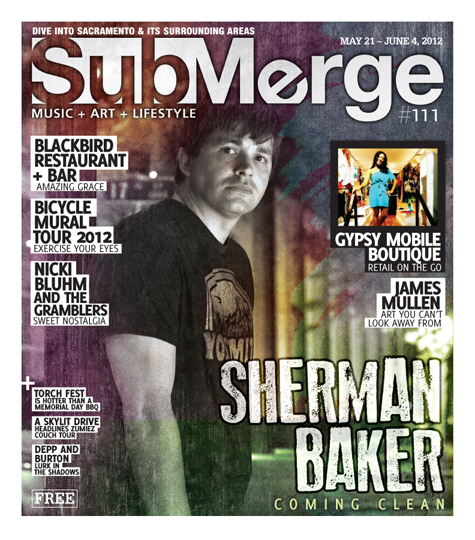
Head to Beatnik Studios in Sacramento on June 2, 2012 to celebrate the release of Sherman Baker’s newest album, Seventeenth Street. Also performing will be Autumn Sky, who also happens to be releasing her new CD that day. If that wasn’t enough for you, Ricky Berger will open. Showtime is 7 p.m. For more info, go to http://shermanbakermusic.com/.
Longtime Sacramento indie/folk-rock darlings Two Sheds will soon be Los Angeleans (boo, hiss). After much time spent in the City of Trees, 30-plus years for bassist/backing vocalist Johnny Gutenberger and 18 for singer/guitarist Caitlin Gutenberger, they are ready for something new. Submerge reached out to Two Sheds and took a line out of one of our favorite songs of theirs, “WTF?” and asked, “What the fuck?”
“We’ve been talking about moving for a long time,” Johnny said. “Not because we hate Sacramento or are ‘down on the scene,’ we just wanted a change.”
It’s understandable, really. It’s a natural thing for human beings, especially creative ones, to crave change after so long in one place. Sometimes new scenery can stimulate the senses.
“We just want to try a new town on for size and see if we can get some fresh inspiration out of it,” Caitlin said. “And we’re purposely moving to a place that won’t be comfortable. We want to be out, motivated and restless for a while.”
“What better place than Los Angeles?” said Johnny.
Their final local gig for quite some time is set for Saturday, May 19, 2012 at Luigi’s Fungarden in Midtown. Johnny and Caitlin will be joined on stage by drummer Rusty Miller, guitarist Chris Larsen and a special guest for this show, Kris Anaya of Doom Bird on keyboard.
“We’re gonna try and fill out our sound a bit,” said Johnny. “We always have these little parts on recordings that don’t get played. Kris is gonna do all that with the keys.”
Two Sheds will have a bunch of cool stuff available at the show, like an EP with five cover tunes (The Troggs, Guided By Voices, The Bobby Fuller Four and more) and special hand-screened posters by Asbestos Press. Purchase a poster, get a download of the EP, purchase a cassette tape, you get a download of the EP, and according to their website (http://ilovetwosheds.com/), “Buy Johnny a beer, you get a friend for life.” Joining them on May 19 will be San Francisco’s Birds and Batteries (whom Two Sheds also covers on the EP), and Dana Gumbiner (of Deathray). Show is all ages, $7 at the door, 8 p.m.
Sacramento Electronic Music Festival 2012
Day 1: Thursday, May 3, 2012
Friday, May 4 was the official Northern California monthly installment for the alt-electronica club night Low End Theory in San Francisco, but an unofficial preview tested the booming systems of Harlow’s on Thursday, May 3 for the opening of the Sacramento Electronic Music Festival. Lorn, Dibia$e, Jonwayne and DJ Nobody are proven low end theorists, earning their stripes at the Los Angeles weekly event held at The Airliner. The four beat masters sent heady vibrations through onlookers’ sternums and the venue’s foundation, but like every year at the SEMF, local electronica talent is in grandiose display.
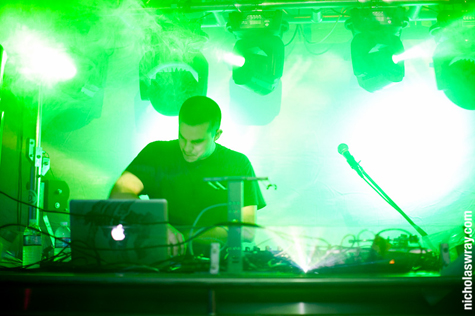
Lorn
It felt as though we were on the move at the third annual SEMF. The round robin of sets in Harlow’s, upstairs at MoMo’s, and DJ sets on the patio had me hesitant to settle in. Decisions had to be made, compromises even, but the careful selection of performers this year almost guaranteed no disappointing sets. Whatever room you occupied was the place to be at the SEMF.
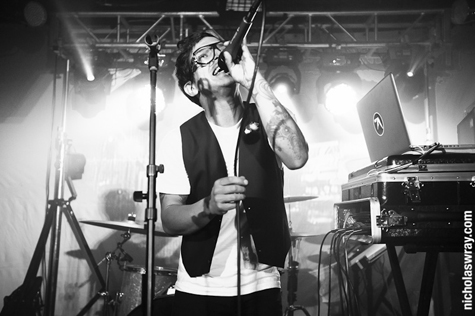
Young Aundee
Jonwayne took the stage for Dibia$e’s set, to streamline raps, while Dibia$e played selector, mutating his beats with glitch takes, warping from track to track without throwing off his rapping amigo in flip-flops. The set bled into Jonwayne’s slot, as he returned the mic to the stand, plugged in his beat machine and rattled the walls with menacing cuts that blended Southern trap rap bravado like Rick Ross’ proclaiming, “I’m treated like a king when I’m dining,” with boss level 8-bit beats and the baritone keys of a grand piano.

Dusty Brown
The Low Enders are the genuine article, but I found great pleasure in the discoveries, particularly Satellites. The presence of the wooden Pandora’s Box known as the Monome was a rare sight to behold, since I can only think of two other beat makers (Daedalus and Galapagoose) who are masters of its magical properties. He’s impossible to Google, so I still know jack shit about him. But Satellites’ push-button magic set an introductory tone for the L.A. vibes that followed.
Local performers like Paper Pistols, Doom Bird and Dusty Brown instilled the 916 pride in our festival. My hope is that the out-of-towners lurked around for the Dusty Brown set and that word will spread regarding our secret weapon. Dusty Brown opened with the unveiling of two new songs before delivering cuts from his concise and captivating This City Is Killing Me EP, which is destined to be a local classic. Opening with unfamiliar material reeled me in. It’s a dangerous move, but the group is justified in its confidence in their new music. I’m more than ready for a new Dusty Brown album.
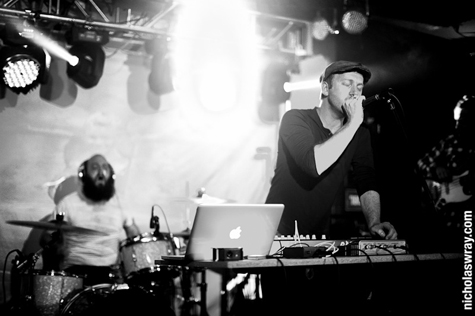
Paper Pistols
Submerge’s very own Adam Saake and his crew at Sacramento Electronic Music Festival, including Clay Nutting of Concerts for Charity, have really outdone themselves with this year’s lineup. The three-day festival will take place on May 3—5, 2012 at Harlow’s and Momo Lounge, and Submerge is proud to be the media sponsor again this year. If you remember anything about last year’s SEMF at Townhouse, you know it was the hottest ticket in town that weekend (there was a line down the block!), and this year will be no different with heavy hitters like Death Grips, Shlohmo, Mux Mool (pictured), Lorn, DJ Nobody, Salva, Dibiase, B. Bravo and Starship Connection confirmed. Also performing will be Giraffage, Raleigh Moncrief, Dusty Brown, Yalls, Doom Bird, Favors, Little Foxes, James & Evander, Dolor, Adoptahighway, Chachi Jones and more. It really is an incredible mix of national and local talent and you can get your three-day pass for a steal, just $30, at Harlows.com. Individual day tickets are $13 a pop. Learn more about SEMF at http://sacelectronicmusicfest.com/ and keep an eye out for coverage right here.
Baroque Bash featuring Doom Bird
Crocker Art Museum, Sacramento – Friday, Jan. 13, 2012
On a normal afternoon the Crocker Art Museum is usually filled with art enthusiasts who quietly soak in the historic and modern art pieces as they roam the halls. But last week on a chilly January night, the art museum was humming. Upon entering the museum lobby, there was a different vibe in the atmosphere. It was filled with excited guests who were patiently waiting for the “Baroque Bash,” a music and art celebration to honor one of the Crockers current exhibitions called Florence and the Baroque: Paintings from the Haukohl Family Collection, to start. People were busy talking in small groups or sipping on glasses of wine and beer. After all, there might not be a better way to properly appreciate 16th century artwork than with a glass of classy wine in hand.
As the room waited patiently for the musical performance by Doom Bird to start, most eyes wandered to the left side of the lobby where museum goers could participate in art demonstrations. A few aspiring artists were caught sketching costume drawings from the Baroque period, along with the help of artist Arturo Balderama. A woman dressed in an elegant dress from the 17th century was modeling for the artists and wandering the lobby so people could appreciate her wardrobe.
The musical portion of the show began with relaxing melodies from three instrumentalists who gracefully took strums at a cello and two violins. During their performance, the majority of the audience members seemed to appreciate the music, but were also a little distracted by their surroundings.
After the classical performance ended, Doom Bird was ready to take the stage (which consisted of two rugs on the floor). Band members Kris Anaya and Joseph Davancens were accompanied by many local musical guests for the night including Krystyna Taylor (cellist from Exquisite Crops), Arjun Singh (drummer from Wallpaper) and Adam Wade (singer from Golden Cadillacs). Depending on the night, Doom Bird enjoys to be backed up by great musical talent to keep their shows lively and entertaining. “Joe and I usually play with a large group of people for shows,” Anaya described in an e-mail the day after show. “It usually keeps the audience excited about what we are trying to present in our music.” Although the band admitted that they had not performed in nine months, the performance from the musical group was peaceful and flawless. Each song provided the audience with calming but powerful music notes, making the perfect blend of classical and alternative tunes.
For most of the set, frontman Anaya didn’t have much to say to the audience except for the occasional thank you. But during the middle of their set, Anaya noted that the lobby of the museum resembled a mini airport. “Welcome to the International Crocker Airport,” he joked over the microphone. Taking a bird’s eye view of the museum, it did resemble a map from a stereotypical “airport.” Starting at the left of the lobby was a bar serving cocktails to guests, then families enjoying their dinners on square tables; the middle of the room was filled with rows of silver chairs facing the stage (resembling a waiting room). It provided an atmosphere that made the museum appear busy and full of life. Throughout the entire set, audience members could take in the “artistic extravagance” of art and music that the Crocker Art Museum had hoped for.
Roman Funerals, X-Ray Press, Winter’s Fall
Sunday, Jan. 30, 2011 – Townhouse – Sacramento
Let’s face it: watching two or more hours of the same genre of music rarely keeps the full attention of any audience, whether it’s thrashy punk rock or a dose of lulling acoustic folk. The jumble of bands playing Sunday’s show at the Townhouse, headlined by Sacramento’s Roman Funerals, provided a different kind of experience instead.

Winter's Fall
I was in the ladies’ room when I heard the drums of the opening band overhead, one hour past show time. I ran upstairs in time to see the five members of the Berkeley, Calif., band Winter’s Fall onstage playing “Anyways” from their newly released album At All Angles. Thirty-five or so people were fanned across the bar and corners of the room. Wearing button-down shirts and sneakers to fit the part, it was the first time the self-described Americana, indie folk rock band had played a show in Sacramento. I was immediately caught off-guard by lead vocalist Peter Stanley’s voice, which varies between a distinctly higher, somewhat nasaly quality like Jon Thor Birgisson in Sigur Ros and a lower range like the voice of The National’s Matt Berninger. The songs lasted four to five minutes, transitioning from upbeat guitar hooks to dreamy layers of guitars mixed with synthesizers and harmonized vocals, creating a full, soothing sound that was both folk and rock. Topped off with the sweet sound of a lap steel guitar and Stanley’s voice, their songs radiated country undertones. They played “Who’s to Say,” also off of At All Angles, and “Paper Chains” from their 2008 release Winter’s Fall.

X-Ray Press
X-Ray Press from Seattle eradicated every ounce of calm left in the room. The five-piece band pounded out a foreign genre that overlaps math rock, hardcore and punk creating a sort of ‘90s-meets-the-future sound. Despite their contagious, frenetic energy complete with head-banging and string tapping, the audience refrained from wriggling and writhing in front of the stage–maybe because they were in shock. Imagine beeping robot sounds composed to distorted guitars and intricate drumming, stopping abruptly to change the tempo two to three times within the same song, and you will have a vague conception of what this band sounded like. Lead vocalists Michael Pasuit and Paurl Walsh exchanged screaming and melodies over the various time signatures, sounding something like Brandon Boyd from Incubus singing over Dennis Lyxzén of Refused.
Roman Funerals headlined the show, fronted by brothers Evan and Matt Ferro of the former Sacramento band Bright Light Fever. Several local performers joined them on stage, including Kris Anaya of Doom Bird and the Alternative String Band. The set began with “Change in Weather,” a haunting opener filled with heavy drums and melancholy guitar riffs. Their songs are lyrically rich and eerie, with the brothers delivering most of the words in harmony with a sort of raw intensity, joined by their acoustic guitars. “I go to sleep at night wearing all my clothes in case the rich kids come to get me. They’ll take me away to a house on the hill and tell me lies about American history,” were the opening lines of “Secrets for Sale,” followed with booming drums, tambourine shakes and echoing “ooh ahhhs” that the audience sang along to. The harmonies joined with the percussion sounded something like Fleet Foxes but with the darkness of a Neko Case song. The accompanying keys, played by Anaya, added just the right touch of mood-setting. They played all the songs from their EP Six of Us, in addition to a cover of the Doom Bird song “Shape of Hearts,” at which point Sacramento’s Alternative String Band joined in with cellos and violins. Only the brothers and the String Band remained on stage to play their final song, “Six of Us,” a melancholy song that they noted “is about our father’s daughter’s children.” The brothers thanked the crowd for sticking around past midnight on a Sunday night at the end of set, and, with an act of generosity, left a stack of 10 free CDs on the stage for the audience to take.

